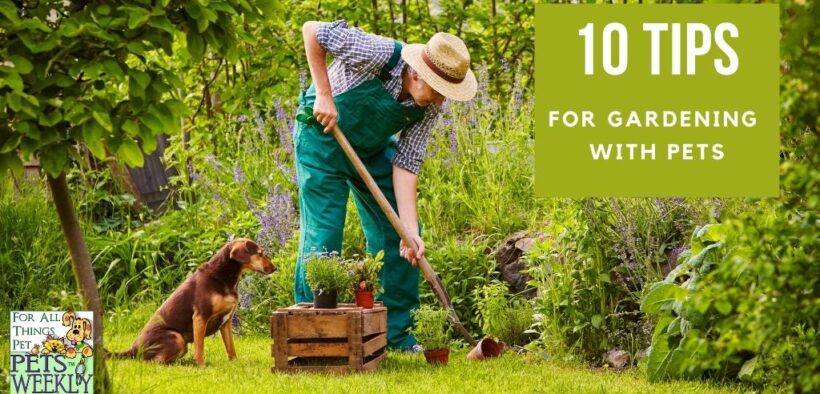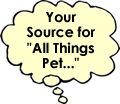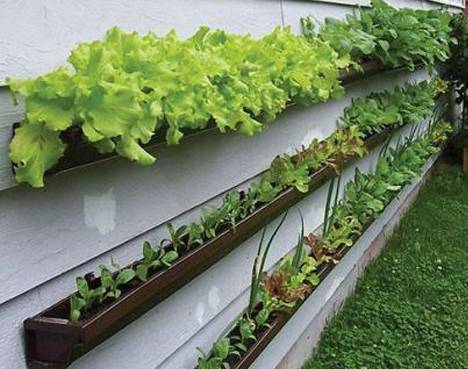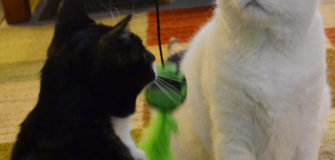10 Tips for Gardening with Pets
Share

Nothing says Spring like a freshly planted garden. It’s an activity that can also be done with your pets and is a great way to bond while creating a special sanctuary that will feed your family.
There are many ways to include your pet in your gardening and even find motivation in gardening with unique plants that serve a purpose (like Plants that Naturally Repel Fleas and Ticks)!

We have compiled a list of gardening tips that will help you make the backyard a truly special place for you and your entire family. We’ve made it easy for you to select the best plants for your garden and also some safety tips when you’re out in the garden with your four-legged friends.
1. Be careful what you plant
Many plants are naturally effective for pest control, and many can even serve a purpose other than eating or looking beautiful or filling the air with the scent of spring.
For example, there are plants that can naturally attract wildlife or helpful insects while still naturally repelling Neighborhood Cats and Fighting Mosquitoes Naturally. Here are a few herbs and plants that will naturally repel deer:
2. Track your tools
Don’t leave out anything that a pet (or person) can step on – even if it’s only for a moment.
Get in the habit of keeping rakes prong-side down and even partially buried when you’re gardening. Never leave tools and pets unattended. We could tell you some stories… We’ve seen pups with puncture wounds from chewing on or stepping on rakes, shovels that have sliced into paws, and even a lost tooth from playful animals dragging tools around the yard together!
3. Create a special garden for your pet.
Catnip, lemongrass, oat and barley grasses are all good choices for a special cat or dog garden.
When working with grasses, be cautious to keep the ends of grasses from blooming as the ends of the grass can cause problems for your pets by getting into paws, ears, and digestive systems like foxtails do.
4. Know your plants.
There are literally thousands of plants that can cause severe illness and even death. Be sure you understand the level of toxicity and how to best avoid poisoning or skin reactions in pets.
The ASPCA has compiled one of the most comprehensive databases of plants and herbs can be toxic to pets. Make sure you review these before putting any type of plant or garden into your yard where animals have access to them.
5. Consider container gardening or hanging gardens.
If your pets are primarily focused on digging in your garden, try container gardening or hanging gardens.
These are also great solutions for planting herbs and other plants that may be toxic to pets or those that you just want to keep out of reach.
6. Avoid fertilizers and pesticides.
An organic garden is (in most cases) a pet-friendly garden. There are many ways to have organic gardens, but the key is to avoid chemicals.
Often, this means that you’ll lose crops to insects. But, if you plan ahead, this doesn’t have to be a reality. The key to a successful organic garden is to plant early and learn how to combine plants and herbs so that they are harmonious with others.
Neem oil is a natural insecticides and safe for your pets. So is food-grade Diatomaceous Earth (DE). Did you know that DE is also effective against ticks and fleas?
Our world provides many great natural resources. While we’re not opposed to “better living through science”, it’s important to access and utilize natural remedies whenever possible.
7. Heartworm and Mosquitoes.
Gardens can be a fertile breeding ground for mosquitoes, which lead to heartworm. Be sure that your pets are all up-to-date on their heartworm protection and consider planting things that naturally repel mosquitoes.
Containers of standing water should be cleaned regularly (this includes bird baths and water bowls). If you live in an area that has lots of standing water after irrigation consider ways to protect your pets from the area as these are breeding grounds for insects.
While Koi ponds are not often an issue for insects, they may become a problem if your pets are preoccupied with the fish. Learn how to keep pets out of your koi pond.
8. Keep pets out of gardens.
The goal of having pets and a garden is to teach your pets to stay out of specific areas. This can be done with your own pets, but it may be more challenging to keep strays out of your yard.
Keep your pets out of your garden by teaching them the places they are allowed to roam. Offer plenty of toys in an area outside of the garden and teach them that the garden is off-limits by reinforcing the behavior.
As we all know, some pets can’t stand to be away from the garden, so fencing may be required. We have plenty of great ideas for that topic, too!
9. Keep wildlife and stray animals away from gardens in a humane way.
There are many ways of keeping critters out of your garden without resorting to lethal means. We have a list of creative suggestions here and here, but you can also explore the many benefits of:
- cougar and/or coyote urine (which can be purchased at your local hunting supply store)
- hanging old CD’s in the garden to keep deer, cats, and other animals out of the garden. As they rotate, light from the sun, moon and exterior lamps will flash from the CD and frighten the animals out of your garden.
10. Avoid Rodenticides
The best way to avoid rodenticides is to never use them. If you have pets, this should be your golden rule.
Your best solution is to use natural means of control (e.g., your pets). Your pets are the best natural deterrent to annoying gophers, mice, and other rodents.
May your Spring garden be filled with beautiful blooms as we learn to live with our wild friends!











